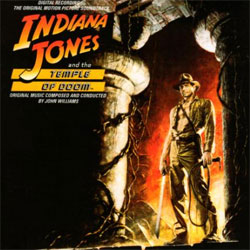| 
Disc 2: Indiana Jones and the Temple of Doom
By comparison to its older sibling, Indiana Jones and the Temple of Doom (1984) is every inch the tempestuous middle-child—barreling along at top speed and full volume, determined to show up its predecessor by sheer force of energy. Temple is a whirling dervish of a score, carousing from one high-velocity escapade to the next, mixing up the pace and tempo just enough for us to catch our breath. My fellow FSM’er Doug Adams has often referred to this score as the “Indiana Jones Dance Suite.” (Think Prokofiev’s Scythian Suite rather than Tchaikovsky’s Nutcracker Suite—indeed, chunks of the score play very much like Prokofiev cross-pollinated with Carl Stalling, e.g. “The Mine Car Chase.”) From the first film, Indy’s theme is of course retained (and there’s a fun quote from “The Basket Game” woven into “The Sword Trick”). New to the party are a spunky theme for Short Round; a big, boozy love theme for Willie; and a dark march for the evil Thuggee priest Mola Ram. Most prominent, however, is the bold theme for the slave children. A demonic Sanskrit chant for the temple rituals and a mystical theme for the Sankara stones round things out…to say nothing of the numerous set-pieces like “Bug Tunnel and Death Trap” and “Water!” Did I mention the show-stopping arrangement of Cole Porter’s “Anything Goes” (in Cantonese, no less, and actually performed by Kate Capshaw) that kicks things off? If all this leaves you thinking, “Whew!” you aren’t alone. The experience of Temple has been justly compared to a roller coaster. If you’re looking for a score to leave you breathless, shot through with adrenaline, and sporting an ear-to-ear grin, this is the one.
What’s new? The original album arrangement of Temple was painfully short, clocking in at under 40 minutes and completely omitting key themes (Mola Ram’s theme is barely heard, while the motif for the Sankara stones is entirely absent). As such, it benefits most from the expanded treatment. Here finally are the opening nightclub sequences; the harrowing flight to India; the incredible trek to Pankot Palace; the religioso music for Indy’s attempt to steal the stones; Short Round’s frenetic escape and Willie’s rescue; the tour-de-force battle through the diamond mines; and the tremendous brass of “Water!”; all culminating in the confrontation on the broken bridge that is the true climax of the score. One listen to this new disc will tell you why this was the #1 item on many fans’ wish lists.
Making things even more thrilling, numerous cues on Concord’s release contain bits and pieces that wound up edited from the film (or were inaudible), meaning they are heard here for the very first time. Unless you’re very familiar with the score as heard in the film, not all of these will be easy to spot, but “Water!,” for example, has some very fine new measures.
What’s on Disc 5? Three cues: “Indy and the Villagers,” which is the scene where the old priest explains how the village’s stone was taken; “The Secret Passage,” which in the film organically connects “Nocturnal Activities” to “Bug Tunnel and Death Trap”; and “Return to the Village/Raiders March,” which covers the film’s finale up through the start of the credits, and reprises the major themes.
What’s missing? Minor cues still MIA include the reprise of “Anything Goes”; the nightclub source music; a short insert in “Fast Streets of Shanghai”; the entire palace feast sequence; and additional variations/elaborations of the Sanskrit chant material, which were recorded and used in various places in the film. More notable omissions are: additional scenes in the Indian village, especially the grand build-up to “Short Round’s Theme”; Mola Ram’s speech and Indy’s subsequent “conversion”; a portion of Willie’s sacrifice; and the tension-building rope bridge percussion that connects “The Sword Trick” and “The Broken Bridge.” An overlay of “Anything Goes” is also missing from “The Nightclub Brawl,” which is irksome since it leaves us with a clever orchestral backdrop to a now-absent melodic line.
Most frustrating to many will be the absence of around 30 seconds of music from the beginning of the End Credits. It’s a short bit, but an important one, combining Indy’s A-theme with Short Round’s theme in counterpoint—a unique compositional device that reveals the final evolution of their thematic relationship. It was excised from the original album in favor of the opening of “Return to the Village,” an awkward edit that has been preserved on Concord’s Disc 2. That wouldn’t be so bad if “Return to the Village/Raiders March” on Disc 5 actually contained the full, film version of the End Credits (as the track title seems to suggest)…but it doesn’t. Whether this omission was the result of creative considerations or budgetary/contractual realities, it’s nonetheless regrettable.
Finally, it’s worth noting that two major cues contain alternate passages. The first is “Map/Out of Fuel,” where the actual “map transition” portion of the cue is taken at a slower tempo and lacks the full statement of Willie’s theme as heard in the film (by way of compensation, it offers a few additional bars of exciting build-up). Frustrated fans are advised to seek out the Lego Indiana Jones game for PC and sift through the OGG music files. (Listen carefully to the Lego files and you’ll also discover an alternate version of “Indy and the Villagers,” which showcases more musical development of the Sankara theme than actually appears in the finished film!) The second alternate passage is heard in “The Scroll/To Pankot Palace,” where the moaning chorus of the film is exchanged for a never-before-heard development of the Mola Ram/Pankot theme.
|









